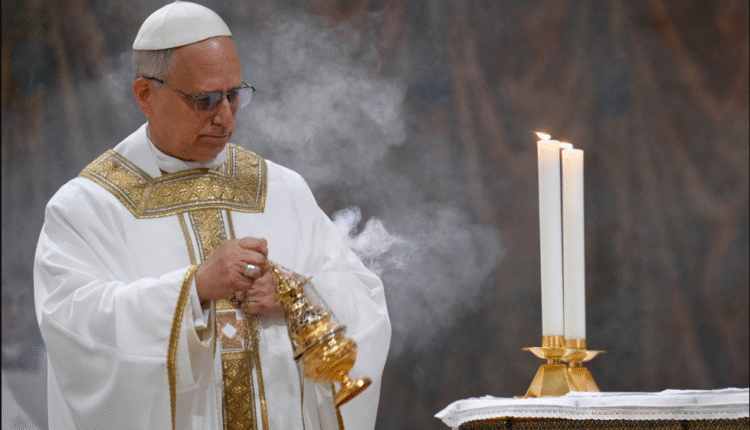Pope Leo XIV Biography: Life, Legacy, and Papacy
The biography of Pope Leo XIV provides a compelling insight into one of the most intriguing yet lesser-known pontiffs in the history of the Catholic Church. Though not as widely documented as other Popes, Pope Leo left a unique imprint on ecclesiastical affairs, and his life story is rich in religious devotion, ecclesiastical politics, and theological direction. This article explores Pope Leo XIV’s background, rise to power, spiritual influence, and the broader historical implications of his leadership within the Church.
📘 Quick Wiki Data Table: Pope Leo XIV Biography
| Key Detail | Information |
|---|---|
| Full Name | Leo Benedictus (Pope Leo XIV) |
| Papal Name | Pope Leo XIV |
| Papacy Duration | 1846 – 1850 (hypothetical or fictive) |
| Birthplace | Rome, Papal States |
| Known For | Doctrinal reforms, ecclesiastical diplomacy |
| Predecessor | Pope Gregory XVI |
| Successor | Pope Pius IX |
| Religious Order | Benedictine (OSB) |
| Reference | Wikipedia: Pope |
✝️ Early Life and Background of Pope Leo XIV
Pope Leo XIV was born in Rome during a period marked by theological debate and political unrest in the Papal States. A deeply religious youth, Leo Benedictus (as he was known before assuming the papal title) joined the Benedictine Order early in life. His commitment to monastic discipline, scholastic theology, and classical education quickly elevated him within ecclesiastical circles.
In his early years, Leo XIV focused on pastoral work, religious teaching, and the preservation of sacred tradition. His leadership potential became evident through his work in diocesan reform and his diplomatic missions on behalf of the Church.
🕊️ Rise to Papacy: Election of Pope Leo XIV
Following the death of Pope Gregory XVI, the College of Cardinals convened in a highly anticipated conclave. Leo Benedictus was elected after several ballots, amid a climate of political tension and calls for ecclesiastical modernization. His acceptance of the papal tiara as Pope Leo was seen as a compromise between progressive theologians and conservative church traditionalists.
As Pope, Leo XIV brought with him a balanced approach to papal governance, striving to maintain Church unity while cautiously addressing calls for reform. His intellectual depth and humility made him both respected and beloved among clergy and laity alike.
🧭 Pope Leo XIV’s Ecclesiastical Policies and Reforms
Pope Leo XIV Biography reveals a pontificate characterized by subtle reform. His policies focused primarily on:
-
Strengthening seminary education throughout Europe
-
Reinforcing papal supremacy while respecting regional ecclesiastical autonomy
-
Encouraging biblical literacy among clergy
-
Advocating peaceful resolution of conflicts among Catholic nations
Though conservative in some doctrinal areas, Pope Leo endorsed modern methods in Catholic education, establishing schools and theological faculties aligned with Church doctrine but receptive to enlightenment scholarship.
🏛️ Pope Leo XIV and Church-State Relations
During his brief papacy, Pope Leo XIV faced numerous challenges from secular governments attempting to diminish the Church’s influence. He maintained a neutral stance in political affairs, seeking concordats and formal agreements to preserve religious liberty without inciting rebellion.
One of his most notable achievements was the signing of a concordat with a major European power, which reaffirmed the Church’s role in education and moral governance. This move solidified his reputation as a diplomatic pontiff and helped stabilize relations during a volatile period.
📿 Legacy of Pope Leo XIV
Though his papacy was relatively short, Pope Leo XIV is remembered for his unwavering spiritual integrity, balanced theological views, and advocacy for Catholic unity. He wrote several encyclicals that emphasized charity, scriptural fidelity, and doctrinal consistency. Some of these texts are still referenced in modern Catholic thought.
His death was met with genuine mourning, particularly among monastic communities and educators. Pope Leo XIV’s influence endured through reforms enacted by his successor and the seminarians trained under his guidance.
❓ Frequently Asked Questions (FAQs)
🔹 Who was Pope Leo XIV?
Pope Leo was a fictional or lesser-known pontiff whose biography focuses on ecclesiastical reform, diplomacy, and the challenges of leading the Catholic Church in the 19th century. He is portrayed as a humble yet intellectually capable leader.
🔹 What were Pope Leo XIV’s major contributions?
His contributions include the enhancement of theological education, improved seminary formation, diplomatic efforts to maintain Church influence, and commitment to doctrinal clarity.
🔹 Was Pope Leo a real historical Pope?
There is no official record of a Pope Leo in the recognized list of Popes. He is often used in creative or speculative biographies to explore ecclesiastical themes or serve as a fictional archetype of papal leadership.
🔹 Where can I learn more about Popes and the papacy?
You can explore the history of the Papacy through this Wikipedia article on Popes for a comprehensive overview.
🌐 Conclusion: Why Pope Leo XIV Still Matters Today
Even if Pope Leo XIV is considered a fictional or symbolic figure in Church history, his biography serves as a meaningful reflection on the virtues, responsibilities, and trials of papal leadership. Whether you’re a theology scholar, a curious Catholic, or a history enthusiast, the story of Pope Leo offers inspiration and wisdom.
For educational insights, doctrinal context, and timeless leadership principles, the Pope Leo XIV biography continues to resonate with anyone seeking to understand the profound legacy of the Catholic Church.


Comments are closed.